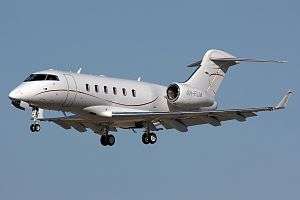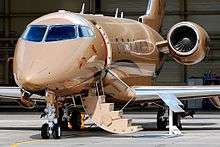Bombardier Challenger 300
| Challenger 300/350 [BD-100-1A10] | |
|---|---|
 | |
| Role | Business jet |
| Manufacturer | Bombardier Aerospace |
| First flight | 14 August 2001[1] |
| Status | in production (350)[2] |
| Primary users | Flexjet XOJET NetJets |
| Produced | 2001-present |
| Number built | 650 (December 2017)[3] |
| Unit cost | |
The Challenger 300 is a 3,100 nmi (5,700 km) range business jet made by Bombardier Aerospace. Announced at the 1999 Paris Air Show, it made its maiden flight on 14 August 2001, received its Canadian type approval on 31 May 2003 and was introduced on 8 January 2004. The Challenger 350 is a slightly improved 3,200 nmi (5,900 km) range variant which first flew on 2 March 2013 and was approved on 11 June 2014. By December 2017, over 650 were delivered including over 200 Challenger 350.
Development

Challenger 300
The baseline Challenger 300 was launched at the 1999 Paris Air Show as the Bombardier Continental.[6] An all-new design, it received Transport Canada type approval on 31 May 2003, followed on 4 June by US FAR 25 certification and on 31 July by European JAR 25 approval.[4] Assembled in Wichita, Kansas, it entered commercial service on 8 January 2004 with Flexjet.[7] The new design is not developed from the Challenger 600 or its variants.
Its supercritical wings have a fixed leading-edge and a 27% sweep angle, its 1.15 m (3.8 ft) winglets reduce cruise lift-induced drag by 17%. It climbs to FL410 in 18 min with a 455 kg (1,003 lb) fuel burn at MTOW/ISA, where at a 14,330 kg (31,590 lb) weight it burns 680 kg (1,500 lb)/h at Mach 0.8 / 445 kn (824 km/h) tas, 875 kg (1,929 lb)/h at Mach 0.83 / 465 kn (861 km/h) tas.[4]
The fuselage and the wing are semi-monocoque aluminum structures, the winglets are composite. Outboard ailerons are manually actuated, elevators and rudder are hydraulic with a mechanical backup, fly-by-wire spoilers augment roll control, act as speedbrakes and dump lift on the ground, hydraulic single-slotted fowler flap have four positions : 0/10/20/30°.[8] The Rockwell Collins Pro Line 21 avionics include four LCD displays, an EICAS and Maintenance Diagnostics Computer, an EGPWS, a TCAS II and an ELT.[9]
Challenger 350
.jpg)
The improved variant first flew on March 2, 2013, was unveiled at the next May EBACE and was due to enter service in May 2014. Hot-section modifications and a FADEC push gave the Honeywell HTF7350 7.3% more takeoff thrust at 7,323 lbf (32.57 kN) with the same flat rating, durability and reliability ; coupled with a strengthened wing with canted winglets and more span allows for 900 lb (410 kg) more full fuel payload. Combined with a more luxurious interior with 20% taller cabin windows, it costs $1 million more at $25.9 million ; its launch customer, NetJets, ordered 75 firm and 125 options.[10]
It received its type certification from Transport Canada on June 11, 2014, from the FAA on June 25 and from the EASA on September 2.[11] Canted winglets have a less acute angle that reduces transonic drag and enlarge the span by 5.2 ft (1.6 m), increasing wing area and aspect ratio. At a weight of 30,200 lb (13,700 kg) it cruises at Mach 0.80 / 455 kn (843 km/h) TAS and is advertised as burning 1,535 lb (696 kg) per hour. Bombardier maintenance program runs $277 per hour and inspection intervals are at 600 hr.[8]
The avionics include four Adaptive LCD Displays, Dual FMS with LPV and RNP approaches capability, SVS, a MultiScan, Weather Radar, Dual IRS, dual SBAS GPS, integrated EFIS and dual VHF and HF radios. It is able to carry eight passengers over a 3,200 nmi / 5,926 km range at a Mach 0.80 (459 kn, 849 km/h) long-range cruise.[12] It is manufactured in Canada.[13]
Operational history
In November 2014, for nearly one million hours of operations, the 448 Challenger 300 in service had a 99.79% dispatch reliability rate ; five-year-old aircraft retain 64% of their original value.[8] At the end of 2015, 550 Challenger 300/350 were in service : 402 in North America, 75 in Western Europe, 37 in Latin America, 12 in Eastern Europe, seven in India, six in Africa and China, four in Asia Pacific and one the in Middle East ; the largest operator was Flexjet with 30 300s and seven 350s, then Netjets with 26 delivered, including four to Netjets Europe.[14]
In 2017, facing competition, Bombardier discounted the price of the Challenger 300/350 by $7 million to match the Embraer Legacy 500's $20 million price.[15] Over 200 Challenger 350 were delivered by December 2017, for over 650 challenger 300 Series deliveries.[3]
Specifications
| Variant | Challenger 300[9] | Challenger 350[12] |
|---|---|---|
| Crew | two | |
| Capacity | eight to nine | nine (standard) |
| Length | 68.63 ft / 20.92 m | |
| Span | 63.84 ft / 19.46 m | 69 ft 0 in / 21.0 m |
| Height | 20.33 ft / 6.20 m | 20 ft 0 in / 6.1 m |
| Wing Area | 523 ft² / 48.5 m² | |
| Aspect ratio | 7.81 | 9.09 |
| MTOW | 38,850 lb / 17,622 kg | 40,600 lb / 18,416 kg |
| OEW | 23,500 lb / 10,659 kg | 24,800 lb / 11,249 kg |
| Fuel capacity | 14,150 lb / 6,418 kg | |
| Maximum payload | 3,500 lb / 1,588 kg | 3,400 lb / 1,542 kg |
| Wing loading | 74.3 lb/ft²/ 363.3 kg/m² | 77.6 lb/ft² / 379.7 kg/m² |
| Turbofans (2×) | Honeywell HTF7000 | Honeywell HTF7350 |
| Thrust[lower-alpha 1] | 6,826 lb / 30.4 kN | 7,323 lbf / 33 kN |
| Maximum speed | Mach 0.82 / 470 kn / 870 km/h | Mach 0.83 / 477 kn / 882 km/h |
| Cruise speed | Mach 0.80 / 459 kn / 850 km/h | |
| Range[lower-alpha 2] | 3,100 nmi / 5,741 km | 3,200 nmi / 5,926 km |
| Ceiling | 45,000 ft / 13,716 m | |
| Takeoff[lower-alpha 3] | 4,810 ft / 1,466 m | 4,835 ft / 1,474 m |
| Landing[lower-alpha 4] | 2,600 ft / 792 m | 2,710 ft / 826 m |
See also
Aircraft of comparable role, configuration and era
References
- ↑ Brooke Shaw (October 1, 2007). "An Inside Look At The Challenger 300". Wings Magazine.
- ↑ "Business Aircraft". Bombardier.
- 1 2 "Bombardier's Newest Challenger Jet Models Surpass Significant Delivery Milestones" (Press release). Bombardier. December 6, 2017.
- 1 2 3 "Flight test: Bombardier Challenger 300 - Polished player". Flight International. 3 Feb 2004.
- ↑ "Business Jets Specification and Performance Data" (PDF). Business & Commercial Aviation. Aviation Week. May 2015.
- ↑ "Trio of new Bombardier Business jets mark Paris Air Show debut" (Press release). Bombardier. June 14, 2003.
- ↑ Graham Warwick (20 Jan 2004). "Challenger 300 makes its service entry with Flexjet". Flight International.
- 1 2 3 Fred George (Nov 1, 2014). "Pilot Report: Bombardier Challenger 350". Business & Commercial Aviation. Aviation Week.
- 1 2 "Challenger 300 Factsheet" (PDF). Bombardier. 2006.
- ↑ William Garvey and Fred George (May 27, 2013). "Bombardier Unveils Challenger 350". Aviation Week.
- ↑ "Bombardier's Challenger 350 Jet Receives EASA Certification" (Press release). Bombardier. September 2, 2014.
- 1 2 "Challenger 350 Brochure and Factsheet". Bombardier. 2016. Archived from the original on 2017-04-21. Retrieved 2017-04-21.
- ↑ Jerry Siebenmark (March 15, 2017). "Is Bombardier 'winding down' Learjet?". The Wichita Eagle.
- ↑ "Monthly Program Profile: Bombardier Challenger 300/350" (PDF). Weekly of Business Aviation. Aviation Week. 28 December 2015.
- ↑ Fred George (Sep 22, 2017). "Legacy 500: Super Midsize Technology Leader Fights For Market Share". Aviation Week Network.
External links
| Wikimedia Commons has media related to: |
- Official website
- Matt Thurber (May 24, 2018). "Pilot Report: Bombardier Challenger 350" (PDF). AIN online.
- Mike Gerzanics (4 June 2018). "Flight test: Bombardier Challenger 350". Flightglobal.